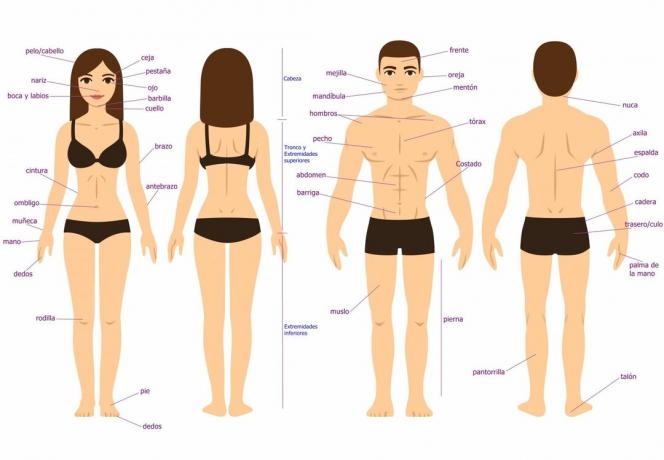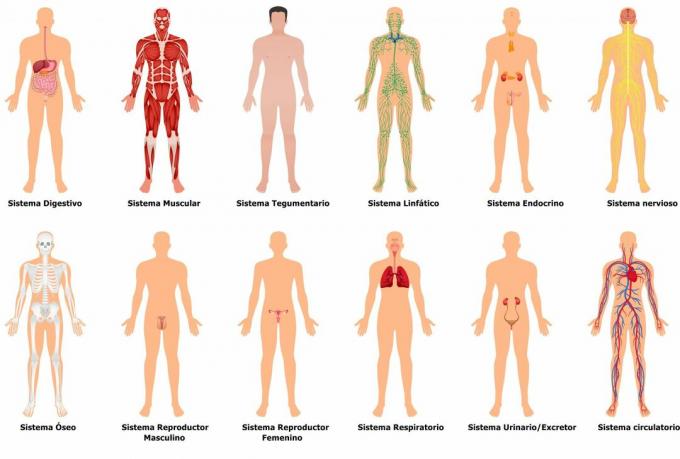How can we talk about physical characteristics if we don't know the parts of the body in Spanish? Therefore, we assume that we speak in Portuguese, therefore, it is very important to know this vocabulary that is elementary. Our body is made up of head, trunk and extremities. Furthermore, it is composed of several systems, such as the digestive, muscular, integumentary systems; lymphatic, endocrine, nervous; bony, reproductive, respiratory; urinary and excretory, circulatory, immunological and sensory system. / How can we talk about physical characteristics if we don't know the body parts in Spanish? It is certainly not how we speak in Portuguese, so it is very important to know this vocabulary, which is elementary. Our body is made up of the head, torso and limbs. Furthermore, it is composed of several systems, such as the digestive, muscular, integumentary, lymphatic, endocrine, nervous, skeletal, reproductive, respiratory, urinary, excretory, cardiovascular, immune and by the system sensory.
Are we going to meet them? / Shall we meet them?
The Human Body Parts

Parts of Cabeza | |
chees |
eyebrows |
Eyelashes |
Eyelashes |
eyes |
Eyes |
Barbilla / Menton |
Chin |
mouth and lips |
mouth and lips |
tongue |
Tongue |
Faces |
Teeth |
hair / hair |
Hair |
Nose |
Nose |
Jaw |
Jaw |
Front |
Forehead |
Oreja |
Ear |
mejilla |
Cheek |
never |
never |
cuello |
Neck |
Trunk Parts | |
men |
shoulders |
Chest |
Chest |
Spade |
Back |
pecho |
Chest |
Abdomen |
Abdomen |
Side |
Side |
Stomach |
Stomach |
Waist |
Waist |
navel |
Belly button |
chair |
Hip |
Backside / Culus |
Butt |
Upper Extremity Parts | |
brazo |
Arm |
forearm |
Forearm |
Armpits |
Armpits |
codo |
Elbow |
Wrist |
Pulse |
Bro |
Hand |
palm |
Palm |
fingers |
fingers |
Lower End Parts | |
pierna |
Leg |
Muslo |
Thigh |
rodilla |
Knee |
pantorrilla |
Calf |
pie |
Foot |
heel |
To heel |
fingers |
fingers |
The Human Body Systems

Our body is made up of several systems
The Sensory System

Our body is composed of five senses, which are part of our sensory system
Some examples:
To talk about physical characteristics (to talk about physical characteristics):
1. María's fur is thick and wide. (Maria's hair is curly and long).
2. Mis ojos are black like la noche. (My eyes are black as night).
3. El pelo de mi madre es canoso. (My mother's hair is gray).
4. Her nose is muy pequeño. (Your nose is too small).
To talk about parts of the body (to talk about body parts):
1. Duel me in the head. (I have headache).
2. He injured the mano derecha. (I hurt my right hand).
3. Ana hizo a surgery on the rod. (Ana had knee surgery).
4. He spent all day on the computer, now duel me on the back. (I spent all day on the computer, now I have back pain).
In Spanish it is common to use in colloquial expressions the parts of the body, which must not be interpreted literally.
(In Spanish it is very common to use body parts in colloquial expressions, which should not be interpreted literally).
Examples:
1. By mouth muere el pez. (Through the mouth the fish dies)
It means that talking a lot can be dangerous, that the persona must be more cautious.
(It means that talking too much can be dangerous, that the person should be more cautious).
Example: “You must not talk too much about the personas. By mouth muere el pez.”
Example: “You shouldn't talk too much about people. Through the mouth the fish dies."
2. Eat la oreja to alguien. (eating someone's ear)
It means convincing someone of something in an insistent way.
(It means convincing someone about something insistently).
Example: “Sometimes I eat la oreja la convenzo”.
Example: "Sometimes, by insisting I convince her."
3. Suck your finger. (sucking finger)
It means to be a naive persona, who suele to accept everything without claims.
(It means being a naive person, who usually accepts everything without complaints).
Example: “Juan asked me to help him do the task, but he didn't do anything… he sucked my finger”.
Example: “Juan asked me to help him with the task, but he didn't do anything... I was naive.”
4. Hablar by los codos.(Talk nineteen to the dozen)
It means talking too much. (It means talking too much)
Example: “Roberto no se callada, he habla por los codos!”.
Example: "Roberto doesn't shut up, he talks through his elbows!"
5. Burn the eyelashes. (Burn the eyelashes)
It means doing something with a lot of effort, like reading, studying, etc.
(It means doing something with a lot of effort, like reading, studying, etc.)
Example: “I've had the eyelashes studying for the prueba!”.
Example: "I studied a lot for the test!"
Hellen de Carvalho
Spanish teacher
Source: Brazil School - https://brasilescola.uol.com.br/espanhol/las-partes-del-cuerpo-humano-en-espanol.htm


